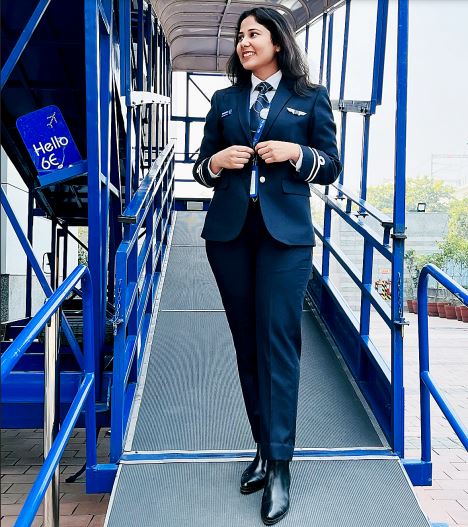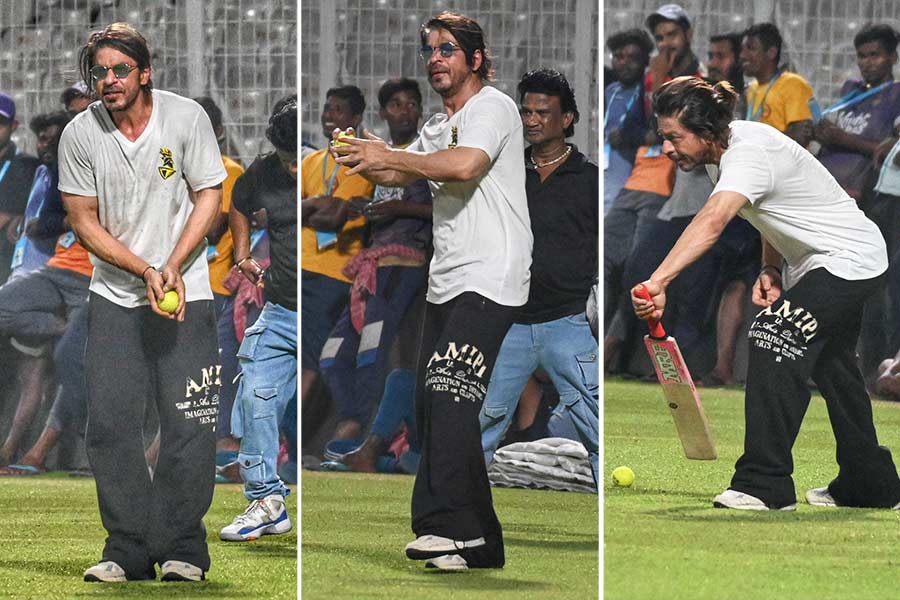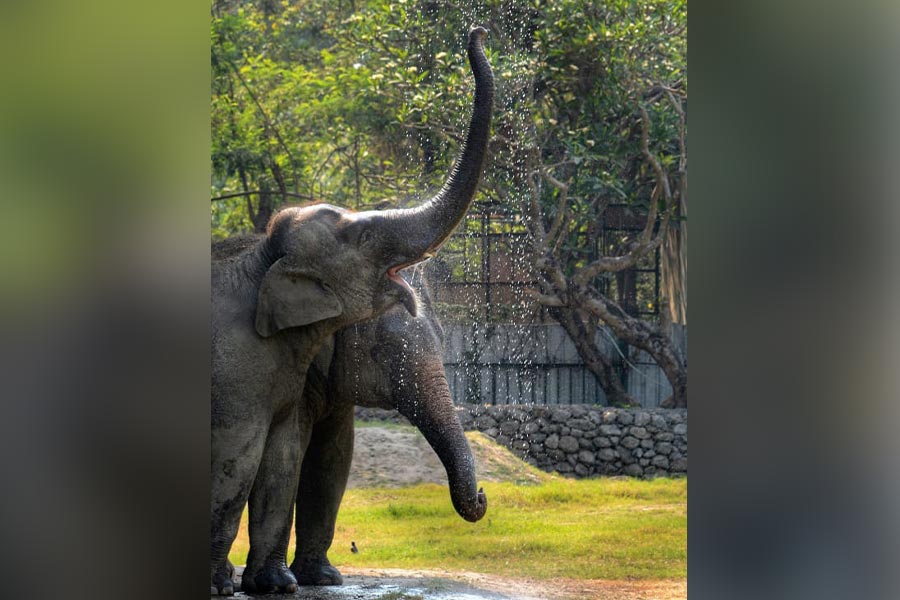Samridhi Mahajan
Occupation: Pilot
Age: 23 years
Resident of: Rosedale Garden, New Town
Calcutta to Mumbai, onward to Bangalore, followed by a layover at Chennai. It’s all in a day’s work for Samridhi Mahajan, just as it would be for any of us driving from home to office, onward to a meeting elsewhere and over to the market before heading back. But Samridhi does it at 35,000ft above terra firma. And it is her roster that decides how many nights in a week she, as a commercial airline pilot, can get back to her city of residence.
Brought up in Pathankot, which has an air force base, Samridhi wanted to become an air force pilot. “I missed a deadline for a form submission and was ready to wait a year. But my parents wanted me to apply somewhere else to utilise the time. So I went to a Chandigarh college to sign up for a graduation course.” But the same day, she was called for a fitness exam for a cadet programme with a commercial airline company that she had applied for. She went on to clear that, a written test and a subsequent group discussion and personality assessment interview.
That has set her off on this flight path.
One year down the line, the job is everything that she had dreamt of. “I have never faced any discrimination as a woman. My airline has possibly the highest ratio of female flight operators in the world. It was about 13-14 per cent when I joined. It must be higher now,” she said with a smile.
The only thing Samridhi had not anticipated is the intense study a pilot has to put in regularly. “We have to keep revising every possible thing in case of emergencies,” she said.
Asked about airstrips which are said to be difficult to land on, like Mangalore and Leh, she points out that pilots get a hang of it after two or three times. “Then all airstrips appear equally easy or tough.”
The longest flight she has done so far is from Thiruvananthapuram to Delhi, which takes three and a half hours. Her favourite sights from the cockpit are views of the Northeast. “Both Itanagar and Imphal airports are beautiful.”
One experience she looks forward to is flying her family someday. “It is difficult as they are based in Punjab and I am posted here. Perhaps that will happen when I get a transfer closer to home,” she signed off.
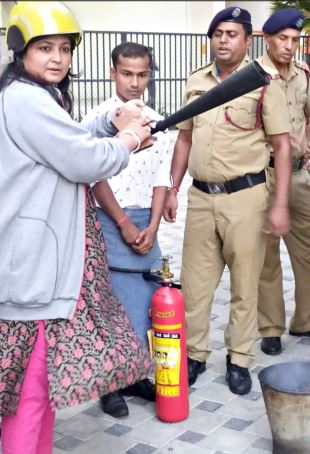
Swagata Biswas
Occupation: Hotel security in-charge
Age: 42 years
Works at: Ibis Kolkata Rajarhat
It is no mean feat for a woman to head the security team in a star hotel. And Swagata Biswas had started out at a time when the recent targeted requirement for human resources to recruit women was not there. “But I have handled all kinds of situations since the time I joined a Delhi hotel in 2006 as a security associate, qualifying over male competitors in a walk-in interview,” pointed out Swagata.
Indeed, her experiences are eye-popping. “Once in a Gurgaon hotel, a woman stormed in, claiming that her husband had checked in with a female colleague. She had probably got a private investigator to trail him. She stormed into the room and a fight broke out, in course of which she slashed her wrist. Imagine the situation!”
Swagata was a security officer then. “We had to handle things in a way that the bleeding woman got medical attention, the other guests were not disturbed and the management did not face harassment,” she recalled.
People, she pointed out, think that dealing with the police or the law or late nights are beyond women. “That is why it was tough to understand the mentality of north Indian male colleagues and learn the job from them while competing with them,” she said.
But she was mentally prepared to work shoulder to shoulder with men. Physically too, standing tall as she does at 5ft 7inches. “Growing up in a Malda village, I used to play basketball with boys.”Her dream was to join the Army. “So I was gearing up for a military career, getting top grades in the National Cadet Corps and qualifying to march on Rajpath as part of the Republic Day parade. But my mother had a mobility problem, so my father was unwilling to let me go,” she recalled.
She went off to stay with an uncle in Delhi and train for competitive exams. The hotel’s job advertisement came to her notice then. “This was as close as I could get to my dream.”Over the years, she has tackled death of a guest in the hotel room in Delhi, fire situations and court appearances. “Once a lady judge at a Barasat court expressed surprise at seeing me as a security manager. It was a nice moment to acknowledge each other, both being in male-dominated professions,” says the mother of two.
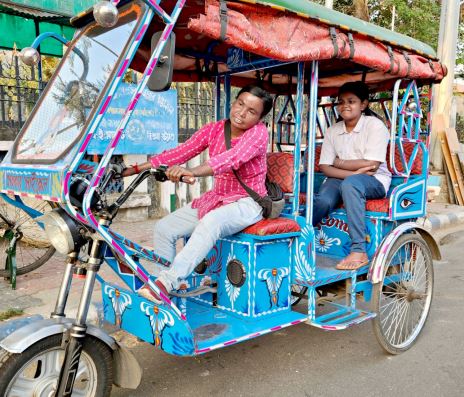
Gayatri Patanaik
Occupation: Rickshaw driver
Age: In her 30s
Resident of: Karunamoyee
She has never heard of International Women’s Day and didn’t even realise it when she broke a glass ceiling. But by becoming possibly the first woman rickshaw driver of Salt Lake, Gayatri Patanaik is but a living example of women’s empowerment.
Gayatri has been driving a rickshaw since 2022 from the AE Market stand. “Neither the other drivers nor passengers accepted me initially but today passengers hug me and click selfies with me. They praise my courage for taking up this profession and some tip me more than the actual fare,” she smiles.
Class topper
Gayatri grew up in the Sundarbans and was born with a congenital skin problem. “When I was in Class V we consulted a new doctor but his medicines made by skin burn all over. I somehow managed to write my exams but that was the last time I went to school. I stood first in class but got bedridden after that,” she says. While her family cared for her dearly, Gayatri wanted to be independent. “I refused to get married and asked friends and relatives in Calcutta to find me a job here,” says the lady who moved out in her late teens and worked in Shyambazar, Maharashtra, and Salt Lake’s AE Block as a domestic help. But life was tough. “Then an uncle, who is a rickshaw driver at the Lake Town footbridge stand, offered to teach me driving. I thought why not,” she says.
Women not allowed
Initially, it didn’t occur to Gayatri that becoming a rickshaw driver would be path-breaking in any way. “After a month of training on my uncle’s vehicle, I was about to buy my own when people started saying no rickshaw stand would accept me. That’s when I realised there were no other women in this field,” says the petite five-foot-nothing who comes to work in jeans, kurti, and sneakers.
Nonetheless, she spent a lakh out of her savings to buy a rickshaw, and then, indeed, the drivers at AE Market refused to let her in as: “Women do not drive rickshaws. I had to spend Rs 50,000 more and my uncle had to pull many a political string to get permission. Even then I was boycotted by the drivers till I agreed to treat them to sweets and 9kg of mutton,” she says.
And then, it was the passengers’ turn to refuse her. “Gentlemen walking out of the market would see me standing first in the row of rickshaws, and approach the one behind me. They had no faith in women drivers and would be confused to see one in the first place,” she says, adding, however, that things have now changed diametrically.
Salute from police
Gayatri proudly says she has never had a skirmish. “During the pujas last year at the 206 bus stand (between AJ and BJ Block pandals) there was massive rush. The cops were lathi-charging all autos and rickshaws and I had landed in that chaos,” she recalls. “But then a traffic policeman spotted me and asked me to stay. A senior officer then came and did namaskar before me. He said he couldn’t believe a woman was negotiating that madding crowd. I was humbled but then, it was just another day at work for me.”
During Visvakarma puja, her fellow drivers drink - they do so even on regular days after work sometimes - but she maintains a dignified distance and they respect her space.
Ashok Sen, a driver at the stand, believes women have the same right as men to choose any job to make a living. “The older manual rickshaws were laborious and women would physically not have been able to move them but that gap has got filled now that we’ve gone electric,” he says.
A young passenger – Ushasree Barman of Class V - said she has ridden Gayatri’s rickshaw many times. “I never stopped to reflect that a woman was behind the wheel as I think women and men can do the same things,” said the girl whose mother runs a flower shop at AE Market. “I want to become a policewoman when I grow up.”
Safe for women
Gayatri lives in a Karunamoyee flat with her cousin Shankari Patri, who works as a domestic help in AE Block and who, along with her uncle Pulin Pramanik, has been instrumental in helping her stand on her feet.
“My parents have no idea about Salt Lake. My mother asks if buses ply here! My father calls me up at night to ask if I’ve reached home,” says the lady who parks her rick in the passage of an AE Block house and cycles home. “I start work at 8.30am, reach home by 11pm but I find the township safe for women and am not scared.”
Gayatri regrets not being able to complete her studies but her eyes twinkle when describing how proud her family is of her. “Hearing my stories and accolades, my brothers say: ‘Amra toh kichui korte parlam na. Bon-i shob korchhe’,” she smiles and drives into the sunset.
What is your message for each of these women featured?
Write to The Telegraph Salt Lake, 6 Prafulla Sarkar Street, Calcutta 700001 or email to saltlake@abp.in


